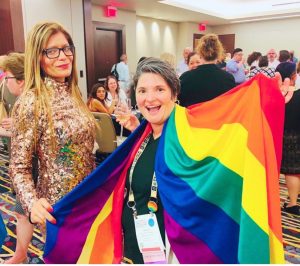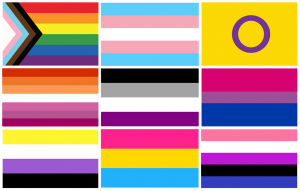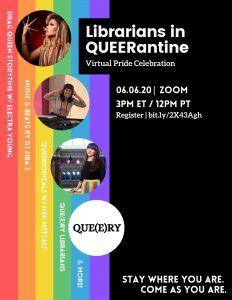(Loida with Deb Sica in June 2019 during the Friday of ALA Annual she, as ALA President at the time, dedicated to honor Pride.)
Happy Pride!
LGBT Pride Month is commemorated each year in the U.S. in the month of June to honor the 1969 Stonewall riots in New York City. It also commemorates events in San Francisco and trailblazing gay activists who tirelessly fought to secure gay and human rights.
As a profession, we have come a long way, but much more work is needed to continue our advocacy of and support for our LGBT colleagues and communities. There are many aspects that still perpetuate bias, discrimination, and endangerment of LGBT populations. These can hurt our family, friends, and colleagues. We must do better. Personally, I welcome voices calling for us to do better. It is the right thing to do.
Thanks to brave librarian activists in the U.S., the Rainbow Round Table (RRT) of the American Library Association (ALA) was founded in 1970 as ALA’s Task Force on Gay Liberation. It is the oldest gay, lesbian, bisexual and transgender group within a professional organization. More recently, on June 23/ 2020, the RRT worked very hard to make an ALA statement on affirming the rights of transgender people happen.
Thanks to trailblazing and fearless individuals such as Marsha P. Johnson, Sylvia Rivera from NYC, and those involved in Obergefell v. Hodges resulting in the U.S. Supreme Court ruling making same-sex marriage a right nationwide, each day we move closer to a world with equal rights for all.
(Flags of the LGBTIQ Community from Outright International)
On June 15, the Supreme Court in the U.S. ruled that the language of the Civil Rights Act of 1964, which prohibits sex discrimination, applies to discrimination based on sexual orientation and gender identity. This civil rights law now protects LGBT workers. It is a tremendous victory. As Outright International- the leading organization advocating for LGBT human rights at the United Nations – said in their statement, “This judgement will have implications for the LGBTQIA+ people everywhere- governments and movements are inspired by each other, and landmark judgements are quoted by courts across the world.”
(Art by David Lopez)
I would like to encourage us all to support our LGBTQAI+ We can all do something from where we are. This year, to celebrate Pride from home, I asked a wonderful team of librarians to collaborate with me to coordinate “Librarians in QUEERantine,” a virtual Pride Celebration. Heartfelt thanks to David Lopez, Edwin Rodriguez, and Ray Pun. For this piece, I asked LGBT librarianship leaders to share messages and resources with the global library community. I am grateful for their responses. Each message is valuable and unique. Thank You to all!
Loida to each library leader: Thank you for your service to our profession. If you could share a message with the library community during the Pride Month, what would it be? What resources would you share with the library community to celebrate Pride?
Alanna Aiko Moore, Librarian for Ethnic Studies, Gender Studies and Sociology at UC San Diego, President of the Asian Pacific American Librarians Association (APALA)
June is Pride month in many communities. People often think of Pride as an epic parade, a week-long party, a huge celebration with concerts and events. Many people do not realize that Pride is held in the month of June to commemorate the 1969 Stonewall Uprising–a series of protests, demonstrations and riots by members of the LGBTQ community against police raids that turned violent. Also forgotten are those BIPOC at the forefront of the Stonewall movement to fight for equality and protest police brutality—people like black trans activists Marsha P. Johnson and Sylvia Rivera.
Knowing this history shows how the LGBTQ community has much in common with the current struggles of the Black Lives Matter movement—from over policing to hate crimes and violence.
The LGBTQ community has deep roots standing up for injustice and inequality and fighting for those among us most marginalized. Many members of the LGBTQ community hold intersectional identities that encompass race, ethnicity, gender, gender identity and sexual orientation. Indeed, Black Lives Matter was founded by black queer women. When we speak about Black Lives Matter and Pride/LGBTQ issues, we must acknowledge the intersections—Black LGBTQ violence and death are consistently overlooked (especially Black trans lives), Black queer folks are disproportionately marginalized and devalued, and the rampant culture of over policing places scrutiny on Black bodies.
As a queer, cisgender, multi-racial Asian American, I will elevate Black voices this Pride month and follow the lead of Black leaders. I will stand in solidarity with the Black Lives Matter movement and with my LGBTQ community. I hold that the safety and wellness of Black people and Black queer people are of the utmost importance. I stand with protestors asking for justice for the senseless murders and state sanctioned violence of Black people, especially Black trans people. I vow to use my privilege to fight systemic racism and implicit bias not only in our library institutions but in the larger world. What will you do for Pride this month?
David Lopez, Librarian, California, Western Region Chapter Representative, REFORMA National (2017-2021), ALA Councilor-at-Large (2017-2020)
It is important to remember that the celebration and empowerment of the LGBTQ+ community should occur beyond Pride month. While June is the observance of the strides the queer community has made in history, it is the daily efforts of members of the LGBTQ+ and our allies that remains the answer to real progress. We need equal representation in the library profession, in administrative positions, and in academica in order for there to be real systemic change.
As a queer Latino, it is the scarce moments in life when I have seen myself represented that I have found the strength to continue my own mission to uplift and honor marginalized voices. The workplace is difficult enough to navigate, but when you factor in inequity, lack of diversity, and understanding, we are all faced with the incessant microagressions that keep us from advancing. So remember that Pride goes beyond a single month and that the true work of library and information professionals is to cultivate a welcoming environment for all, be they patron or colleague.
Here are is a list of resources that will keep Pride going year around:
https://www.thetrevorproject.org
https://www.translatinacoalition.org
Ana Elisa de Campos Salles: Past-chair, American Library Association’s Rainbow Round Table, ALA Councilor-at-Large, Branch Manager at the San Francisco Public Library
My background is in public libraries, working with area schools and community organizations, and specifically working with teens and adults, so my answers will be very public-centric. My message is: use Pride as an opportunity to educate folx about the social justice roots of Pride and to normalize queer identity as part of the intersectional spectrum in which we all live. It can also be used to engage people in conversations about what qualities we value as a society and want to center in ourselves and younger generations.
Don’t forget to have fun with it! Pride is fierce, but it’s also a celebration. Celebrate diversity. Celebrate equity. Celebrate inclusion. Celebrate kindness and compassion.
There are so many great resources out there! Here are a few:
ONE Archives Foundation LGBTQ History Lesson Plans – Complete, downloadable lesson plans for teachers. Audre Lorde, Bayard Rustin, queer social justice movements, oh, my!
Professional Tools from the Rainbow Round Table – I would be remiss if I didn’t mention the Rainbow Round Table and the ever-growing list of toolkits, specialized bibliographies, and other resources available for free. Anyone is also welcome to sign up to our member and executive board listservs.
If you’re into visual, engaging resources, hop on YouTube and check out some really great channels, such as The History of the LGBTQ+ Civil Rights Movement, or enter key words and see what comes up, like this series of diverse, international LGBTQ TED Talks on the queer experience. A lot of these topics can easily inspire conversations and programs for teens, parents, and the general public at school or your local library.
Thomas Chaimbault-Petitjean, Responsable du pôle Formations initiales des fonctionnaires stagiaires, Direction des études et des stages – Pôle Formations initiales des fonctionnaires, Université de Lyon; Convener of IFLA LGBTQ Users Special Interest Group
Libraries and Prides have this in common, that they build a positive space connecting LGBTQI + communities members to their history and culture.
Both remind these men, women, others, and their allies that they are not alone, that they are part of a larger movement for equal rights; that their voices, like those of other marginalized groups, count.
Libraries support individuals in building their own identities by giving them access to collections, spaces and services. It is through these that they can question, build and affirm what they are, wish to be, feel to be.
This space of opportunities is a wall against economic and health crises, the increase in disparities or cultural and social inequalities. This space, these resources are golden.
It is important for LGBTQI+ Communities members to use them, and for libraries to work with community members to be more relevant and accurate. We have to work all together, we have to learn from each other; we can be stronger.
So, no matter where you are from, your state of health, your gender identity, your sexual orientation, your physical appearance, your weight, your religion, your age, your marital status, your disability, your political opinions, etc., You are welcomed; and be proud!
Martin Garnar, Dean and Professor, Kraemer Family Library, University of Colorado in Colorado Springs
As the U.S. Supreme Court decisions are often announced in June, we have had the happy timing of learning about the expansion of marriage and employment rights during Pride Month. Both of these are important victories for the LGBTQ+ community, but we still have much work to do, including addressing the racism that still exists within our community. Stonewall would not have happened without the leadership of black trans activists and we need to honor that leadership by working for justice for everyone still facing oppression. One place you can start is to support the work of the Black Trans Advocacy Coalition (https://blacktrans.org/). Justice for some of us is meaningless unless there is justice for all of us.
Meg Metcalf, Library’s women’s, gender and LGBTQ+ studies collection specialist at the Library of Congress, President of the District of Columbia Library Association
If I could share one message with the Library community this Pride Month, it would be to ask them to consider the ways in which their institutions have centered white, cisgender, heterosexual people as the default and the very real impact this has on marginalized people and communities. Some questions to ask of yourselves and your institutions this Pride month: Do we provide LGBTQ+ programs and services all year (not just during Pride) and do we fund them at the same level as other collections and services? Is our library a safe place for the LGBTQ+ community, and how do we actually assess that? Does our institution offer trans inclusive health care for staff? Do we have a thoughtful and explicit policy and/or procedures in place to follow if and when our library is challenged on an LGBTQ+ issue, whether that be a program, exhibit, item, or staff member? Are we meeting the needs of LGBTQ+ patrons and staff members, and what assessment measures are we using to ensure that we are? Do you assume that your LGBTQ+ patrons speak English and/or are U.S. Citizens? What services do you offer for the non-English speaking and/or undocumented LGBTQ+ community? Are you able to equally serve and accommodate LGBTQ+ patrons and staff with access needs? Do you offer services for LGBTQ+ homeless youth?
Some resources to celebrate Pride:
LGBTQ+ Resource Guide: https://guides.loc.gov/lgbtq-studies
History of Pride Story Map: https://go.usa.gov/xwU5y
Documentary footage of the first Pride march in NYC in 1970: https://www.youtube.com/watch?v=OevqwHmeEFI
Library of Congress Pride Portal: https://www.loc.gov/lgbt-pride-month/
Pride at 50 From Stonewall to Today (Blog Post): https://blogs.loc.gov/loc/2020/06/pride-at-50-from-stonewall-to-today/
Stonewall Uprising, Today in History: https://www.loc.gov/item/today-in-history/june-28/
Stonewall 50: Panel Discussion on LGBTQ+ Research: https://www.loc.gov/item/webcast-8776/
Happy Pride!!!!
Philippe Colomb, Deputy manager, Médiathèque Françoise Sagan in Paris, France
Thank you for this request. As an openly gay professional and an LGBTQI activist, the message I would like to share today would be “make the library a place for democratic debate”. It seems to me that it is important for the library to be a space that both reflects all the diversity of society and allows for an argumentative discussion of the tensions that run through it. For this reason, we must not just be « flag-bearers »: we must be pedagogues who allow everyone to question their situation and those of others. By our collections and actions, we should help, in particular, to popularise the concepts of privileges, gender construction, discrimination, intersectionality etc. I think these are often misunderstood and caricatured notions and that librarians are in a particularly good position to ensure a better understanding of these concepts and to allow critical yet peaceful discussion around them.
In terms of resources, I would advise French-speaking colleagues to read the blog « Légothèque »(<https://legothequeabf.wordpress.com>) which has been working for years on the role of libraries in self-construction and the fight against stereotypes. This is a particularly useful ressource.
Rae-Anne Montague, she/her; they/them, Chair Elect, ALA Rainbow Round Table, Chicago State University Information Studies
Happy Pride 2020!
This is usually a joyous time. In a typical June, we gather together to celebrate our shared interests and achievements and enjoy each other’s company. We have much to celebrate – literature, legislation, legacies, and love. Love is foundational.
This year, as we approach the golden anniversary of the founding of the American Library Association’s Task Force on Gay Liberation, now the Rainbow Round Table – the nation’s first LGBTQIA+ professional organziation, we have adjusted our plans for pride in the face of a pandemic. Still, we connect and reflect. We find renewed strength in our queerness. Looking back, we recall fun times and fond memories mixed in with some uncertainties and pain. We are still here – reading, writing, speaking, listening, taking action. We recognize and we are grateful to those who have struggled and to those who continue to guide us towards equity and justice. We mourn those we have lost. While ours is not a single story, we share a common sense of optimism for our future. We look forward to continuing to work together across communities to overcome emergent and persistent challenges and to creating a more sustainable spectrum of existence.
Here is a sampling of fabulous e-resources of possible interest to the library community:
➤ The Arquives is an organization dedicated to celebrating, preserving, and collecting LGBTQIA+ stories and histories. https://arquives.ca
➤ Digital Transgender Archive is an online hub for digitized historical materials and information on archival holdings throughout the world. https://www.digitaltransgenderarchive.net
➤ Excavating Black Queer Thought: A Pride Bibliography I and II are resources to illuminate the multiplicity of experiences existing within Black LGBTQIA+ life. https://www.aaihs.org/excavating-black-queer-thought-a-pride-bibliography-ii
➤ Gerber/Hart Library and Archives collects, preserves, and makes accessible items related to LGBTQ history and culture. https://www.gerberhart.org
➤ GLSEN is an organization that conducts extensive research to inform K-12 education and to ensure LGBTQIA+ students are supported and included. https://www.glsen.org
➤ IFLA LGBTQ Users Special Interest Group is dedicated to sharing professional knowledge by offering opportunities to engage in discussion. https://www.ifla.org/lgbtq
➤ The Kinsey Institute is a research hub on critical issues in sexuality and gender. https://kinseyinstitute.org
➤ Kumu Hina offers resources related to the story of a Native Hawaiian who is a proud māhū, (transgender woman) and respected kumu (teacher). https://kumuhina.com
➤ Lambda Literary is an organization dedicated to LGBTQIA+ books and authors that offers programs and annual literary awards. https://www.lambdaliterary.org
➤ Leather Archives and Museum is a community archives, library, and museum of Leather, kink, fetish, and BDSM history and culture. https://leatherarchives.org
➤ The Legacy Project collects, preserves, and educates about LGBTQIA+ contributions to world history and culture. https://legacyprojectchicago.org
➤ Lesbian Herstory Archive offers the world’s largest collection of materials by and about lesbians and their communities. http://www.lesbianherstoryarchives.org
➤ LGBT Books to Prisoners is a prison abolitionist project focused on sending books to incarcerated LGBTQ-identified people. https://lgbtbookstoprisoners.org
➤ Mariposas Sin Fronteras is a group seeking to end the systemic violence and abuse of LGBTQ people held in prison and immigration detention. https://mariposassinfronteras.org
➤ Making Gay History provides LGBTQIA+ oral histories focused around civil rights. https://makinggayhistory.com
➤ National AIDS Memorial offers dedicated space and services to gather, heal, hope, and remember. https://aidsmemorial.org
➤ National Park Service LGBTQ Heritage shares stories and images celebrating LGBTQ histories across the United States. https://www.nps.gov/subjects/tellingallamericansstories/lgbtqheritage.htm
➤ ONE National Gay and Lesbian Archives features a large repository of LGBTQIA+ materials. https://one.usc.edu
➤ Que(e)ry Librarians organzies events to encourage community among queer information professionals and their friends. https://www.queeryparty.org
➤ The Queer Zine Archive Project (QZAP) is a free on-line searchable database of queer zines. https://www.qzap.org
➤ Rainbow Book List / Over the Rainbow are annual bibliographies of quality books with significant and authentic LGBTQIA+ content from the American Library Association’s Rainbow Round Table. https://glbtrt.ala.org/rainbowbooks; https://www.glbtrt.ala.org/overtherainbow
➤ Rainbow Heritage Network is an organization committed to the recognition and preservation of sites, history, and heritage associated with sexual and gender minorities. https://rainbowheritagenetwork.org
➤ Sisters of Perpetual Indulgence is a boastfully queer organization dedicated to community service, outreach, and exuberance. https://www.thesisters.org
➤ Stonewall Book Awards, sponsored by the American Library Association’s Rainbow Round Table, was the first and is the most enduring award for LGBTQIA+ books.
http://www.ala.org/rt/rrt/award/stonewall/honored
➤ Jean-Nickolaus Tretter Collection is an LGBTQIA+ archival repository with books, periodicals, grey literature, personal and organizational records, zines and pamphlets, artifacts and ephemera, and audiovisual materials housed at the University of Minnesota Libraries. It includes the Tretter Transgender Oral History Project, which makes available oral histories of gender transgression, broadly understood through a trans framework. https://www.lib.umn.edu/tretter
➤ Trevor Project is an organization providing crisis intervention and suicide prevention. https://www.thetrevorproject.org
Also, be sure to connect with and support your local LGBTQIA+ community groups!!





